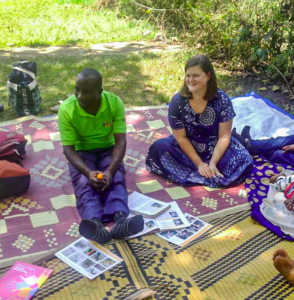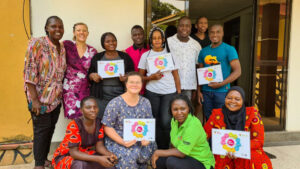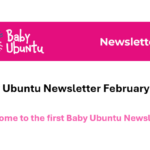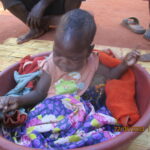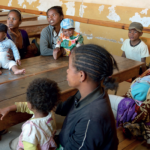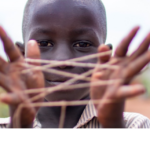‘You are welcome here’ was the most common phrase that I heard in Uganda whenever I met someone new. It was clear from the start that those working with children with disabilities in Uganda have a deep sense of warmth and empathy which emanates within the first few seconds of meeting them. I reflect on how I greet people- I might say ‘It’s a pleasure to meet you’ or ‘How are you today?’ but I am inspired to start with ‘You are welcome here’ because I know how it made me feel. So, without further ado, you are welcome here if you would like to read about an inspiring visit to Uganda.
I’m Kirsten, an occupational therapist and researcher from South Africa, now living in the UK. My work in the rural Eastern Cape with caregivers of children with cerebral palsy (CP) has inspired my research career. Since coming to the UK, I have been fascinated by the richness of resources available for disabled children, but I also longed for the simplicity of a group of caregivers and children, building a community, and sharing learning. I was delighted to discover ‘Playskill’ groups for children under five with physical disabilities, where I conducted my master’s research. Around the same time, I discovered the work of researchers at the London School of Hygiene & Tropical Medicine who developed ‘Getting to Know Cerebral Palsy’ (GTKCP), which has since evolved into ‘Ubuntu’ and ‘Baby Ubuntu,’ specifically for young children and babies. Thanks to Twitter, I met Dr Michelle Heys, who was working on adapting ‘Ubuntu’ for the UK, as she too recognised the need for group support. Now, I’m fortunate enough to have a HARP-funded PhD fellowship to adapt ‘Baby Ubuntu’ for a diverse community in East London.
As part of my PhD, I had the privilege of visiting the Baby Ubuntu team in Uganda. Rachel Lassman, the Global Coordinator, organised an amazing week, including a three-day master training course in Kampala for facilitators from across Uganda. I had in-depth discussions with group facilitators and expert mothers involved in the programme. It was wonderful to see how proud the facilitators were that their intervention was being adapted for the UK. Many assumed that Baby Ubuntu was already running there or that the need was lower. I assured them that there is significant need for supportive group interventions in the UK, and caregivers there also face isolation, just like they did. These discussions reminded me of the problematic concept of ‘reverse innovation,’ which assumes innovation only flows from high-income countries. It was gratifying to challenge this and share that there is much to learn from their work. During the master training, I loved the way people were thanked for contributing, with gestures like ‘ giving flowers’ where everyone shakes their hands in the air as though ‘clapping’ in sign language. These small rituals, along with icebreakers, dancing movement breaks, and unique clapping formations, fostered a strong sense of community and I wondered if there could be equivalent practices in the UK or if this was something unique to Africa?
A trip highlight was visiting a Baby Ubuntu group in Kiwoko, hosted by the warm and welcoming ‘Big Sam’. Sitting under a tree with caregivers and children with CP transported me back to joyful moments in Madwaleni, Eastern Cape. I tried to bottle up every detail, as it reminded me of my ‘why’ for pursuing the PhD. The power of a group is something that can’t be replicated in individual sessions. I imagined threads bouncing around the group and connecting the caregivers and the children as they shared experiences and engaged in discussions. I imagined these threads represented connections forming between caregivers, helping them to feel less alone and like they can rely on others. Growing up in post-apartheid South Africa, I was constantly exposed to the word ‘Ubuntu’ and learned that it meant ‘I am because you are’. These group threads embody Ubuntu, reminding us of our interconnectedness and humanness, despite differences or disabilities. In Uganda, having a disabled child can be stigmatising, leading caregivers to keep their child isolated at home. Baby Ubuntu encourages caregivers to bring their child out, promoting love, play, and joy. The name Baby Ubuntu is exceptionally fitting.
Raising a child with a disability is a journey, with mental health difficulties being commonly noted in academic publications. In Uganda, openly discussing feelings of sadness and pain is not the norm, but expert mother Lucy often comforts caregivers by sharing her own experiences. As Rachel said, “Never underestimate the power of your story,” highlighting the importance of expert parents as group facilitators. My favourite quote from Dr Peter Rosenbaum is “professionals have textbooks, parents have story books”, which underscores the power of personal stories in reducing loneliness and fostering connections. During my Masters research on Playskill groups for children under five with physical disabilities, I found that social comparisons in a group could impact caregiver mental health. Facilitators in Uganda shared how parents could find comfort in learning that others were going through the same challenges. Additionally, those with greater challenges could inspire gratitude in other parents.
A final reflection relates to ‘empowerment’ or ‘okukulakulanya’ in Luganda. In Uganda, parents must be empowered to fight for their child’s rights, even against doctors or nurses who refuse vaccinations or accuse them of neglect for malnourishment. The importance of ‘courage’ as a component of empowerment struck me in this context. In the UK, there may be less incentive to feel empowered, and as an occupational therapist, I reflected on working with parents who prefer to be led initially. There is no right or wrong way of doing things and each journey is unique. I wonder if in the UK, there is a way to nurture parents gently, to provide safe spaces while they process their grief, until they are ready to feel those stirrings of courage? I’m pleased that our adapted UK intervention will be called ‘Encompass’, meaning ‘to hold’ and ‘to surround’. It also conveys inclusion and suggests support in ‘navigating’ services with the word ‘compass’.
As I progress into the next phase of my PhD which is adapting the intervention, I will be grounded in the two names of ‘Baby Ubuntu’ and ‘Encompass’ which I interpret as creating a safe space for connections to form, for families to be gently held and surrounded, and for always remembering the humanity of those that we work with.
